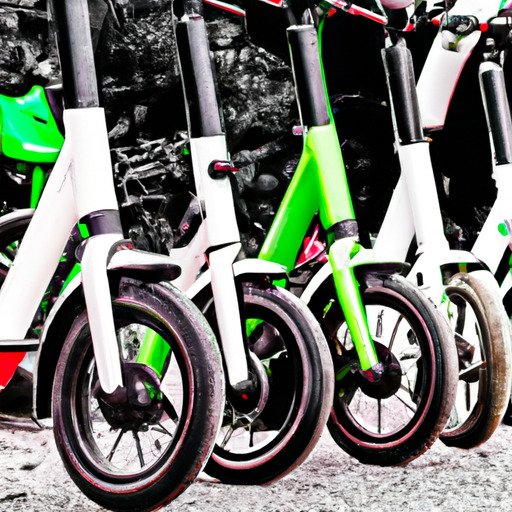
Have you ever wondered if e-bikes require a license or registration? Well, you’re not alone! Many people are curious about the rules and regulations surrounding these popular electric bikes. In this article, we’ll explore whether e-bikes require a license or registration, and what the laws are in different countries. So, if you’re eager to hit the road on an e-bike or are just curious about the legal requirements, keep reading to find out more! E-bikes have become increasingly popular in recent years, offering a convenient and eco-friendly mode of transportation. Whether you’re commuting to work or enjoying a leisurely ride on the weekends, e-bikes provide an enjoyable way to get around. However, there is some confusion surrounding the legal requirements for operating an e-bike. In this article, we will explore whether e-bikes require a license or registration and delve into the regulations and requirements surrounding these electric-powered bicycles.

What are e-bikes?
Before we delve into the legal requirements for e-bikes, let’s first define what exactly an e-bike is. Simply put, an e-bike, or electric bicycle, is a bicycle that is equipped with an integrated electric motor. This motor is used to assist with pedaling, providing a boost of power that allows riders to travel faster and with less effort. E-bikes come in various designs and styles, but they all share the common feature of being powered by electricity.
Definition of e-bikes
E-bikes are typically classified based on their maximum speed and motor power. Most countries have regulations in place that define the specific criteria an e-bike must meet to be legally classified as such. For example, in the United States, an e-bike is defined as a bicycle with a motor that has a maximum power of 750 watts (1 horsepower) and is capable of reaching speeds up to 20 miles per hour on level ground.
How e-bikes work
Now that we understand what e-bikes are, let’s take a closer look at how they work. E-bikes are generally equipped with a rechargeable battery pack that powers the electric motor. When you pedal, the motor is activated and provides additional assistance to your pedaling motion. This can make riding uphill or against strong headwinds much easier and more enjoyable. Some e-bikes also come with a throttle control that allows riders to engage the motor without pedaling, similar to a scooter or moped.
Different types of e-bikes
E-bikes can be divided into two main categories based on how the motor is activated and controlled.
Pedal-assist e-bikes
Pedal-assist e-bikes, also known as pedelecs, are the most common type of e-bike. As the name suggests, these e-bikes provide assistance to your pedaling. When you start pedaling, the motor kicks in, providing a boost that makes pedaling easier. The level of assistance can usually be adjusted, allowing riders to choose how much power they want the motor to provide.
Throttle-controlled e-bikes
Throttle-controlled e-bikes, on the other hand, can be operated without pedaling. These e-bikes are equipped with a throttle similar to that found on a motorcycle or scooter. By twisting the throttle, riders can engage the motor and move forward without the need to pedal. Throttle-controlled e-bikes are often preferred by individuals who may have difficulty pedaling for long periods or who simply prefer the convenience of not having to pedal.
Legal classification of e-bikes
As e-bikes have gained popularity, governments around the world have implemented regulations to ensure their safe and responsible use on public roads and pathways. The legal requirements for e-bikes can vary from country to country, so it’s important to familiarize yourself with the regulations specific to your area.
E-bike regulations worldwide
In many countries, e-bikes are classified as bicycles and are subject to the same rules and regulations that apply to traditional bicycles. This means that e-bike riders are generally not required to obtain a separate license or registration for their vehicle. However, there are often specific criteria that e-bikes need to meet in order to fall under this classification. These criteria typically include factors such as motor power, maximum speed, and whether or not the e-bike is equipped with a throttle control.
Classification of e-bikes in different countries
It’s worth noting that the classification of e-bikes can vary from country to country. For example, in the United States, e-bikes are classified into three main categories: class 1, class 2, and class 3.
- Class 1 e-bikes are equipped with a motor that provides assistance only when the rider is pedaling and cuts off when the bike reaches a speed of 20 miles per hour.
- Class 2 e-bikes have a throttle control that allows riders to engage the motor without pedaling and have a maximum speed of 20 miles per hour.
- Class 3 e-bikes are similar to class 1 e-bikes, but the motor assistance can reach speeds up to 28 miles per hour.
It’s important to understand the specific classification of e-bikes in your country, as this will determine the legal requirements for operating and using these vehicles.
Do e-bikes require a license?
One of the most common questions surrounding e-bikes is whether or not they require a license to operate. The answer to this question depends on several factors, including the classification of the e-bike and the regulations in your specific jurisdiction.
License requirements for e-bikes
In many countries, e-bikes that meet the classification criteria do not require a separate license to operate. This is because they are considered to be bicycles and are subject to the same regulations as traditional bicycles. However, it’s important to check the specific regulations in your area, as there may be restrictions based on factors such as age or the maximum speed of the e-bike.
Age restrictions for riding e-bikes
Some jurisdictions have age restrictions in place for riding e-bikes. For example, in the United States, riders must be at least 16 years old to operate a class 3 e-bike. The specific age restrictions can vary from country to country, so it’s important to familiarize yourself with the regulations specific to your area.

Do e-bikes require registration?
Another common question is whether or not e-bikes need to be registered. Again, the answer to this question depends on the regulations in your specific jurisdiction.
Registration requirements for e-bikes
In many countries, e-bikes that meet the classification criteria do not require registration. This is because they are classified as bicycles and are subject to the same regulations as traditional bicycles. However, there may be additional requirements in place for e-bikes that exceed certain criteria, such as maximum motor power or speed.
Benefits and drawbacks of registering e-bikes
While registration may not be required for most e-bikes, there can be benefits to voluntarily registering your e-bike. For example, some cities offer incentives such as free parking or access to bike lanes for registered e-bikes. Additionally, in the event of theft or loss, having a registered e-bike can make it easier to recover or identify your stolen property. It’s important to weigh the benefits against any potential drawbacks or costs associated with registration to determine if it is the right choice for you.
Safety regulations for e-bikes
In addition to the legal requirements for operation, there are also safety regulations in place to ensure that e-bike riders are protected while on the road.
Protective gear for e-bike riders
Just like traditional bicycles, e-bike riders should always wear a helmet to protect their head in the event of a fall or collision. Additionally, it is recommended to wear reflective clothing or accessories to increase visibility, especially when riding at night or in low-light conditions. It’s also a good idea to equip your e-bike with front and rear lights to ensure that you remain visible to other road users.
Rules and regulations for riding e-bikes on roads
The rules and regulations for riding e-bikes on roads are generally the same as those for traditional bicycles. E-bike riders are typically required to follow traffic laws, obey traffic signals, and ride in the same direction as other vehicles. However, it’s important to be aware of any specific regulations in your area, as certain roads or pathways may have restrictions on e-bike usage.
Insurance for e-bikes
While insurance is not typically mandatory for e-bike riders, it is worth considering for added protection and peace of mind.
Insurance coverage for e-bikes
Some insurance companies offer coverage specifically tailored to e-bikes. This can include coverage for theft, damage, or liability in the event of an accident. Additionally, some home insurance policies may already provide coverage for e-bikes, so it’s important to review your existing policies or speak with your insurance provider to determine if additional coverage is necessary.
Benefits of having insurance for e-bikes
Having insurance for your e-bike can provide financial protection in the event of theft, damage, or accidents. It can also provide coverage for personal liability if you are involved in an accident with another individual or vehicle. Insurance can give you peace of mind knowing that you are protected against unexpected situations that may arise while riding your e-bike.
Enforcement of e-bike laws
Enforcement of e-bike laws can vary from jurisdiction to jurisdiction, and penalties for violating these laws can also differ.
Enforcement practices in different jurisdictions
In some areas, e-bike laws are strictly enforced, with law enforcement officers actively patrolling and issuing citations for violations. In other areas, enforcement may be more lenient, with officers focusing on more serious violations or crimes. It’s important to familiarize yourself with the enforcement practices in your area to ensure that you are in compliance with the law.
Penalties for violating e-bike laws
Penalties for violating e-bike laws can range from warnings and fines to confiscation of the e-bike. The specific penalties will depend on the nature of the violation and the regulations in your area. It’s always best to adhere to the laws and regulations governing e-bikes to avoid any potential legal consequences.
Impact of e-bike regulations
The regulations surrounding e-bikes can have a significant impact on their popularity and adoption.
Effect of regulations on e-bike sales
Stringent regulations or requirements, such as the need for licenses or registrations, can deter potential e-bike buyers and limit their market appeal. On the other hand, less restrictive regulations can encourage more people to consider purchasing and using e-bikes as a means of transportation or recreation.
Public opinion on e-bike laws
The public opinion on e-bike laws is varied and can depend on factors such as personal experience, familiarity with e-bikes, and environmental considerations. While some individuals may argue that e-bikes should be subject to the same regulations as traditional bicycles, others may believe that additional requirements are necessary to ensure the safety and responsible use of e-bikes on public roads and pathways.
Conclusion
In conclusion, whether or not e-bikes require a license or registration depends on the regulations in your specific jurisdiction. In many countries, e-bikes that meet certain criteria are considered bicycles and are subject to the same rules and regulations as traditional bicycles. However, age restrictions, speed limits, and other factors may apply. It’s important to familiarize yourself with the specific regulations in your area to ensure that you are in compliance with the law. Additionally, while insurance is not typically mandatory for e-bike riders, it can provide added protection and peace of mind. Overall, e-bikes offer a convenient and eco-friendly mode of transportation, and understanding the legal requirements for operating them is essential for a safe and enjoyable riding experience.




















